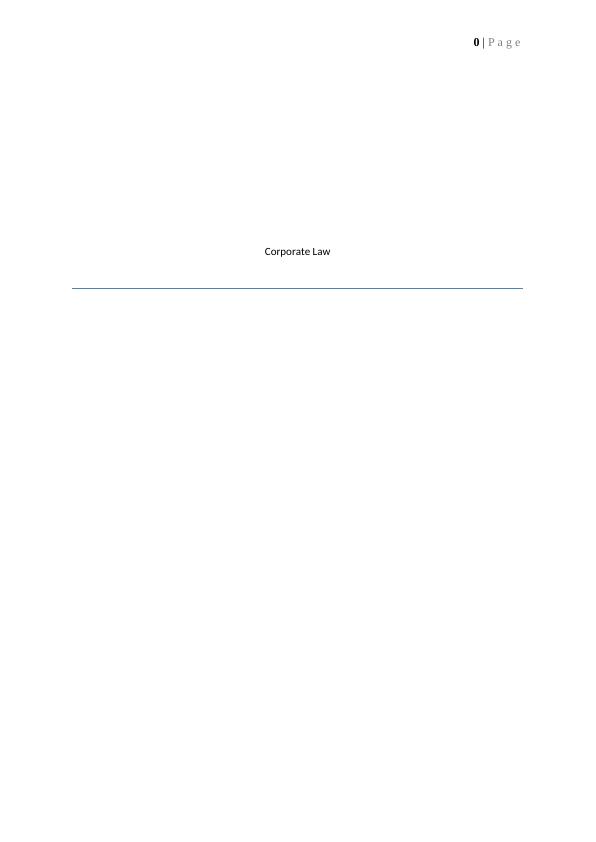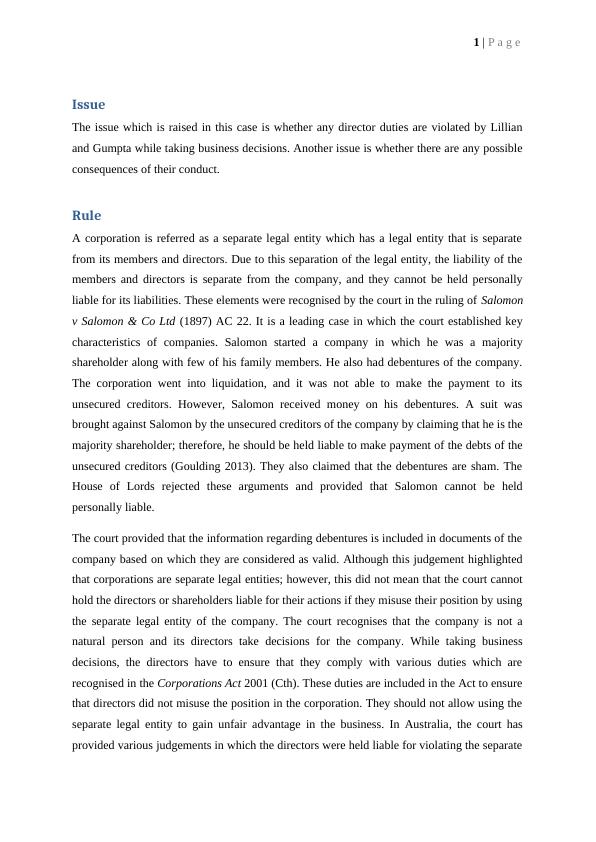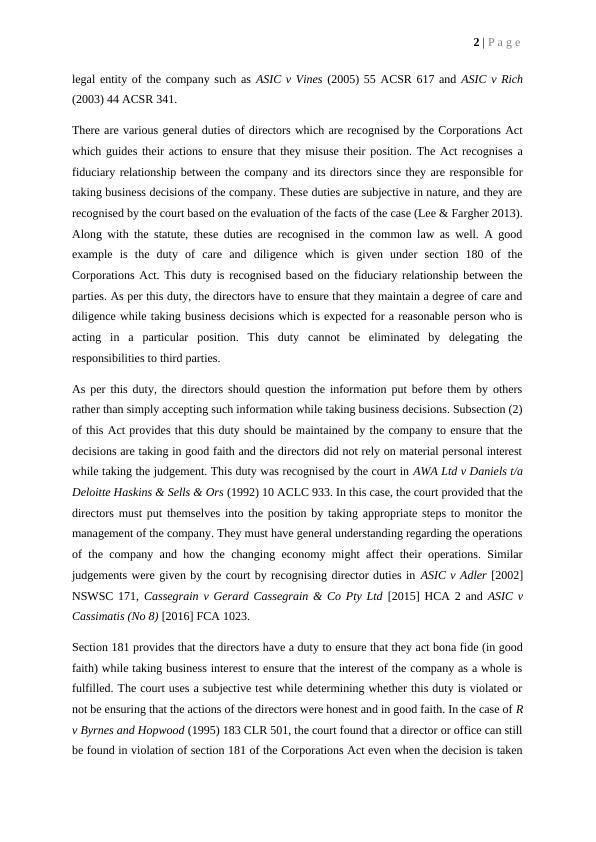Violation of Director Duties in Corporate Law
Added on 2023-04-21
7 Pages2464 Words293 Views
0 | P a g e
Corporate Law
Corporate Law

1 | P a g e
Issue
The issue which is raised in this case is whether any director duties are violated by Lillian
and Gumpta while taking business decisions. Another issue is whether there are any possible
consequences of their conduct.
Rule
A corporation is referred as a separate legal entity which has a legal entity that is separate
from its members and directors. Due to this separation of the legal entity, the liability of the
members and directors is separate from the company, and they cannot be held personally
liable for its liabilities. These elements were recognised by the court in the ruling of Salomon
v Salomon & Co Ltd (1897) AC 22. It is a leading case in which the court established key
characteristics of companies. Salomon started a company in which he was a majority
shareholder along with few of his family members. He also had debentures of the company.
The corporation went into liquidation, and it was not able to make the payment to its
unsecured creditors. However, Salomon received money on his debentures. A suit was
brought against Salomon by the unsecured creditors of the company by claiming that he is the
majority shareholder; therefore, he should be held liable to make payment of the debts of the
unsecured creditors (Goulding 2013). They also claimed that the debentures are sham. The
House of Lords rejected these arguments and provided that Salomon cannot be held
personally liable.
The court provided that the information regarding debentures is included in documents of the
company based on which they are considered as valid. Although this judgement highlighted
that corporations are separate legal entities; however, this did not mean that the court cannot
hold the directors or shareholders liable for their actions if they misuse their position by using
the separate legal entity of the company. The court recognises that the company is not a
natural person and its directors take decisions for the company. While taking business
decisions, the directors have to ensure that they comply with various duties which are
recognised in the Corporations Act 2001 (Cth). These duties are included in the Act to ensure
that directors did not misuse the position in the corporation. They should not allow using the
separate legal entity to gain unfair advantage in the business. In Australia, the court has
provided various judgements in which the directors were held liable for violating the separate
Issue
The issue which is raised in this case is whether any director duties are violated by Lillian
and Gumpta while taking business decisions. Another issue is whether there are any possible
consequences of their conduct.
Rule
A corporation is referred as a separate legal entity which has a legal entity that is separate
from its members and directors. Due to this separation of the legal entity, the liability of the
members and directors is separate from the company, and they cannot be held personally
liable for its liabilities. These elements were recognised by the court in the ruling of Salomon
v Salomon & Co Ltd (1897) AC 22. It is a leading case in which the court established key
characteristics of companies. Salomon started a company in which he was a majority
shareholder along with few of his family members. He also had debentures of the company.
The corporation went into liquidation, and it was not able to make the payment to its
unsecured creditors. However, Salomon received money on his debentures. A suit was
brought against Salomon by the unsecured creditors of the company by claiming that he is the
majority shareholder; therefore, he should be held liable to make payment of the debts of the
unsecured creditors (Goulding 2013). They also claimed that the debentures are sham. The
House of Lords rejected these arguments and provided that Salomon cannot be held
personally liable.
The court provided that the information regarding debentures is included in documents of the
company based on which they are considered as valid. Although this judgement highlighted
that corporations are separate legal entities; however, this did not mean that the court cannot
hold the directors or shareholders liable for their actions if they misuse their position by using
the separate legal entity of the company. The court recognises that the company is not a
natural person and its directors take decisions for the company. While taking business
decisions, the directors have to ensure that they comply with various duties which are
recognised in the Corporations Act 2001 (Cth). These duties are included in the Act to ensure
that directors did not misuse the position in the corporation. They should not allow using the
separate legal entity to gain unfair advantage in the business. In Australia, the court has
provided various judgements in which the directors were held liable for violating the separate

2 | P a g e
legal entity of the company such as ASIC v Vines (2005) 55 ACSR 617 and ASIC v Rich
(2003) 44 ACSR 341.
There are various general duties of directors which are recognised by the Corporations Act
which guides their actions to ensure that they misuse their position. The Act recognises a
fiduciary relationship between the company and its directors since they are responsible for
taking business decisions of the company. These duties are subjective in nature, and they are
recognised by the court based on the evaluation of the facts of the case (Lee & Fargher 2013).
Along with the statute, these duties are recognised in the common law as well. A good
example is the duty of care and diligence which is given under section 180 of the
Corporations Act. This duty is recognised based on the fiduciary relationship between the
parties. As per this duty, the directors have to ensure that they maintain a degree of care and
diligence while taking business decisions which is expected for a reasonable person who is
acting in a particular position. This duty cannot be eliminated by delegating the
responsibilities to third parties.
As per this duty, the directors should question the information put before them by others
rather than simply accepting such information while taking business decisions. Subsection (2)
of this Act provides that this duty should be maintained by the company to ensure that the
decisions are taking in good faith and the directors did not rely on material personal interest
while taking the judgement. This duty was recognised by the court in AWA Ltd v Daniels t/a
Deloitte Haskins & Sells & Ors (1992) 10 ACLC 933. In this case, the court provided that the
directors must put themselves into the position by taking appropriate steps to monitor the
management of the company. They must have general understanding regarding the operations
of the company and how the changing economy might affect their operations. Similar
judgements were given by the court by recognising director duties in ASIC v Adler [2002]
NSWSC 171, Cassegrain v Gerard Cassegrain & Co Pty Ltd [2015] HCA 2 and ASIC v
Cassimatis (No 8) [2016] FCA 1023.
Section 181 provides that the directors have a duty to ensure that they act bona fide (in good
faith) while taking business interest to ensure that the interest of the company as a whole is
fulfilled. The court uses a subjective test while determining whether this duty is violated or
not be ensuring that the actions of the directors were honest and in good faith. In the case of R
v Byrnes and Hopwood (1995) 183 CLR 501, the court found that a director or office can still
be found in violation of section 181 of the Corporations Act even when the decision is taken
legal entity of the company such as ASIC v Vines (2005) 55 ACSR 617 and ASIC v Rich
(2003) 44 ACSR 341.
There are various general duties of directors which are recognised by the Corporations Act
which guides their actions to ensure that they misuse their position. The Act recognises a
fiduciary relationship between the company and its directors since they are responsible for
taking business decisions of the company. These duties are subjective in nature, and they are
recognised by the court based on the evaluation of the facts of the case (Lee & Fargher 2013).
Along with the statute, these duties are recognised in the common law as well. A good
example is the duty of care and diligence which is given under section 180 of the
Corporations Act. This duty is recognised based on the fiduciary relationship between the
parties. As per this duty, the directors have to ensure that they maintain a degree of care and
diligence while taking business decisions which is expected for a reasonable person who is
acting in a particular position. This duty cannot be eliminated by delegating the
responsibilities to third parties.
As per this duty, the directors should question the information put before them by others
rather than simply accepting such information while taking business decisions. Subsection (2)
of this Act provides that this duty should be maintained by the company to ensure that the
decisions are taking in good faith and the directors did not rely on material personal interest
while taking the judgement. This duty was recognised by the court in AWA Ltd v Daniels t/a
Deloitte Haskins & Sells & Ors (1992) 10 ACLC 933. In this case, the court provided that the
directors must put themselves into the position by taking appropriate steps to monitor the
management of the company. They must have general understanding regarding the operations
of the company and how the changing economy might affect their operations. Similar
judgements were given by the court by recognising director duties in ASIC v Adler [2002]
NSWSC 171, Cassegrain v Gerard Cassegrain & Co Pty Ltd [2015] HCA 2 and ASIC v
Cassimatis (No 8) [2016] FCA 1023.
Section 181 provides that the directors have a duty to ensure that they act bona fide (in good
faith) while taking business interest to ensure that the interest of the company as a whole is
fulfilled. The court uses a subjective test while determining whether this duty is violated or
not be ensuring that the actions of the directors were honest and in good faith. In the case of R
v Byrnes and Hopwood (1995) 183 CLR 501, the court found that a director or office can still
be found in violation of section 181 of the Corporations Act even when the decision is taken

End of preview
Want to access all the pages? Upload your documents or become a member.
Related Documents
Liability of a Holding Company for the Negligence of its Subsidiarylg...
|9
|2477
|184
Piercing of Corporate Veil in Australian Contextlg...
|13
|3525
|318
Commercial and Corporation Law Case Study Analysislg...
|7
|1425
|426
Liability for Breach of Duties in Corporate Lawlg...
|11
|2638
|330
Business Law Assignment PDFlg...
|5
|2388
|92
Separate Legal Entity of Corporation : Essaylg...
|6
|1848
|37
